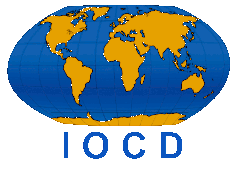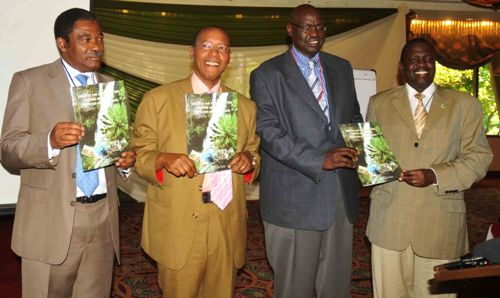
International Organization for Chemical Sciences in Development

International Organization for Chemical Sciences in Development
⇑ Former Working Groups and Projects
For many years IOCD operated the BEF, which worked to encourage and facilitate the sustainable and equitable exploitation of natural resources for local benefit in low- and middle-income countries (LMICs) and for global benefit. Below we present some highlights from the work of this important IOCD initiative and salute the scientists who contributed to its success: in particular the leadership of John Kilama, supported by Michael Tempesta.
Exploitation of the Earth's physical and biological resources has always been a feature of human activities, but the pace and extent of this exploitation have increased greatly in the last two centuries driven by and feeding technology advances, economic growth and population expansion.
Many LMICs which have been mainly the source of raw materials such as minerals and primary agriculture products now wish to reap the economic and developmental benefits of increasing production and adding value to the materials through processing. At the same time, global concern for the environment requires that all countries conserve their natural resources, engage in sustainable development and not follow pathways that may lead to pollution, exhaustion of resources and loss of biodiversity.
Some examples of key contributions of chemistry to these challenges include developing cleaner, more efficient, less energy-intensive and less polluting extraction and refining methods for minerals; methods for the recycling of inorganic and organic materials; and new substitute materials that can be produced more sustainably.
Chemists in many parts of the world work on the isolation, structure elucidation and bioassay of natural products. These studies have made exceptionally valuable contributions to human health and wealth:
The exploitation of biological resources has become an area of particular concern. Conservation of biodiversity is considered vital for long-term human survival because plants, animals and bacteria can be the source of new nutrients, genes conferring resistance to crop pests, drugs for combating diseases and much else. This implies that studies are undertaken globally to uncover these valuable assets, but exploitation needs to conserve their stocks as well as ensuring appropriate rewards for their owners. Countries which have some of the most valuable and diverse and least studied biological resources — often LMICs — have sometimes experienced ‘biopiracy’ in which samples of plants or knowledge about their uses have been taken abroad and exploited without benefit to the country of origin or to the local inhabitants whose indigenous knowledge has been the key.
Valuable lessons have been learned from the experience of LMICs that have developed ways to meet these challenges. One ground- breaking example has been that of Costa Rica, a Central American country which covers 0.04% of the world's total land area, yet is believed to harbour about 4-5% of the estimated terrestrial biodiversity of the Earth. In 1989, Costa Rica founded the Instituto Nacional de Biodiversdad (INBio) to gather knowledge on the country's biological diversity, its conservation and its sustainable use. In 1991, INBio instituted an innovative agreement with a multinational pharmaceutical company, in which Merck was granted the right to evaluate the commercial prospects of up to 10,000 plant, insect, and microbial samples collected in Costa Rica. In return for these ‘bioprospecting’ rights, Merck paid INBio US $1 million over two years, and provided equipment for processing samples and scientific training. Merck also agreed to pay a royalty — to be shared equally by INBio and the Costa Rican Ministry of Environment and Energy — on the profits of any future pharmaceutical product or agricultural compound that isolated or developed from an INBio sample. Subsequently, INBio negotiated several further bioprospecting contracts involving other partners than Merck, including Eli Lilly, with the result that income from INBio's bioprospecting activities rose to about US$1 million per year.
The Costa Rica example demonstrates the possibility of conducting research to identify new medicinal products from natural sources in an LMIC, in a way that preserves property rights, generates a financial return and encourages capacity building.
Many of the lessons were taken forward in the International Cooperative Biodiversity Groups Program, initiated in 1992 to make multi-disciplinary, multi-institutional awards to foster work on the three interdependent issues of drug discovery, biodiversity conservation, and sustainable economic growth.
In collaboration with Thomas Eisner (known as the "father of chemical ecology"), in 1995 IOCD established a Working Group known as the Biotic Exploration Fund (BEF), to facilitate and catalyse ethical bioprospecting worldwide. Initial funding to set up the BEF came from the US National Academy of Sciences, the American Chemical Society, the John D. and Catherine T. MacArthur Foundation, UNESCO and the Novartis Foundation for Sustainable Development. (For links, see the Funding page.)
The BEF has assisted several LMICs in Africa, Asia and Latin America to develop policies for ethical, sustainable bioprospecting, helping establish the foundations for new products and processes that will contribute to better health and economic development.
Bioprospecting links laboratory work on biodiversity by a country's scientists with local enterprises, which bring to market products based on the scientists' findings. At the same time, bioprospecting involves a commitment to conserving a region's biodiversity to ensure its survival and usefulness for future generations.
IOCD's contributions to biotic exploration have included work in Latin America, Asia and Africa. These have been aimed at stimulating interest in bioprospecting and facilitating engagement of the local scientists and policy makers. They have often involved sustained engagement over several years to support national initiatives. Examples of IOCD action include:

Launch of Kenya's new Bioprospecting Strategy at the Safari Park Hotel, Nairobi on 3 November 2011. Left to right:
Mr. M.A. Wa Mwachai, Permanent Secretary, Ministry of Forestry and Wildlife; Hon. Mutula Kilonzo, Minister for Justice, National Cohesion and Constitutional Affairs; Dr. John Kilama, IOCD; Mr. Julius Kipng'etich.
In promoting bioprospecting, IOCD strives to comply with the UN Convention on Biological Diversity. Charles Weiss and Thomas Eisner, both of whom helped to launch IOCD's BEF, discuss some of the challenges and useful strategies of bioprospecting in an article [1]. For reprints, please contact IOCD.
The Nagoya Protocol on Access to Genetic Resources and the Fair and Equitable Sharing of Benefits Arising from their Utilization to the Convention on Biological Diversity is an international agreement which aims at sharing the benefits arising from the utilization of genetic resources in a fair and equitable way, including by appropriate access to genetic resources and by appropriate transfer of relevant technologies, taking into account all rights over those resources and to technologies, and by appropriate funding, thereby contributing to the conservation of biological diversity and the sustainable use of its components. It was adopted by the Conference of the Parties to the Convention on Biological Diversity at its tenth meeting on 29 October 2010 in Nagoya, Japan.
Kim Lewis and Fred Ausubel have published a detailed analysis of strategies for bioprospecting specifically aimed at developing antibacterials [2].
IOCD's John Kilama has co-authored a review of the value of natural biological resources as a source of new medicines [3], in an important work co-sponsored by the UN Development Programme, UN Environment Programme, Secretariat of the Convention on Biodiversity and World Conservation Union.
Other useful literature on biodiversity and bioprospecting:
⤒ Top
Organisation Internationale des Sciences Chimiques pour le Développement
61 Rue de Bruxelles
B 5000 Namur, Belgium
Quick links:
home
site map
support
contact us
legal notice